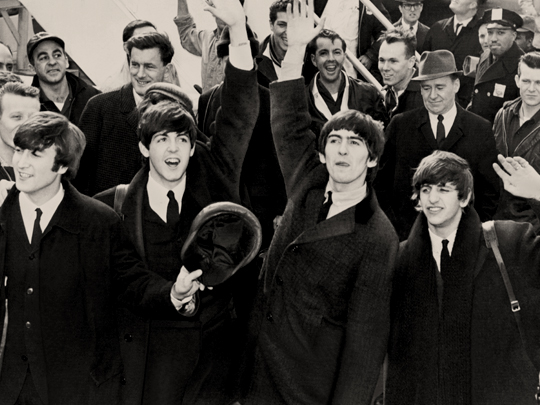MaxPixel / CC-BY-SA-3.0 / GFDL
1 – The Beatles Take the United States by Storm
The Beatles arrived in the United States for the first time on 7 February 1964.
In addition to establishing the Beatles’ international stature, it changed attitudes to popular music in the United States, whose own Memphis-driven musical evolution had made it a global trend-setter.
Their popularity in the United States was marked by an intense demand for the single “I Want to Hold Your Hand”, which sold one-and-a-half million copies in under three weeks.
The visit, advertised across the United States on five million posters, was a defining moment in the Beatles’ history, and the starting point of the British Invasion.
Following popular television appearances and concerts during their February visit, the Beatles returned to the United States in August 1964, and again in August 1965, for tours.
In August 1966, they returned, and although this tour was commercially successful, it coincided with a storm of U.S. public protest after the publication of John Lennon’s remarks about Christianity.
The 1966 U.S. tour marked the end of the Beatles’ concert days.
The band ceased to perform commercial concerts, instead, devoting their efforts to creating new material in the recording studio.
2 – Cassius Clay Wins World Title – Converts to Islam, and is renamed, Muhammad Ali
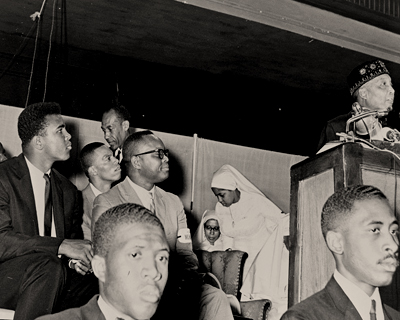
On February 25, 1964, Cassius Clay caused an upset to win the WBA and WBC heavyweight titles from Sonny Liston.
Liston did not answer the bell for the seventh round, and Clay was declared the winner by TKO. Clay, at age 22, the youngest boxer to take the title from a reigning heavyweight champion.
Shortly after, Clay converted to Islam and affiliated with the Nation of Islam. He changed his name from Cassius Clay, which he called his slave name, to Muhammad Ali.
He set an example of racial pride for African Americans and resistance to white domination during the 1960s Civil Rights Movement.
Only a few journalists, notably Howard Cosell, accepted the new name at that time.
Ali later stated, “I am America. I am the part you won’t recognize. But get used to me. Black, confident, cocky; my name, not yours; my religion, not yours; my goals, my own; get used to me.”
Ali’s friendship with Malcolm X ended as Malcolm split with the Nation of Islam a couple of weeks after Ali joined, and Ali remained with the Nation of Islam.
Ali later said that turning his back on Malcolm was one of the mistakes he regretted most in his life.
3 – Gulf of Tonkin Incident
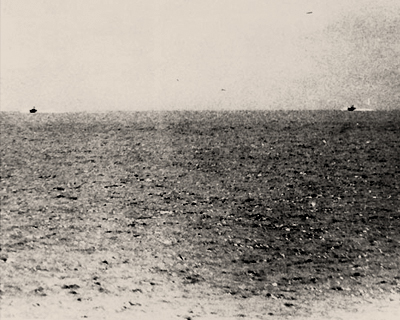
Official US Navy photo / Wikimedia Commons / CC-BY-SA-3.0 / GFDL
The Gulf of Tonkin incident involved two separate confrontations involving North Vietnam and the United States in the waters of the Gulf of Tonkin.
The original American report blamed North Vietnam for both incidents, but eventually became very controversial with widespread claims that either one or both incidents were false, and possibly deliberately so.
On August 2, 1964, the destroyer USS Maddox was pursued by three North Vietnamese Navy torpedo boats.
Maddox fired three warning shots and the North Vietnamese boats then attacked with torpedoes and machine-gun fire, in an alleged sea battle.
One US aircraft was damaged, three North Vietnamese torpedo boats were allegedly damaged, and four North Vietnamese sailors were said to have been killed, with six more wounded.
There were no U.S. casualties. Maddox was undamaged except for a single bullet hole from a Vietnamese machine gun.
A Second incident was claimed to have occurred on August 4, but instead, evidence was found of false radar images and not actual North Vietnamese torpedo boats.
In The Fog of War, former U.S. Secretary of Defense Robert McNamara admitted the August 2attack happened with no Defense Department response, but the August 4 Gulf of Tonkin attack never happened.
As a result, Congress passed the Gulf of Tonkin Resolution, which granted US President Johnson the authority to assist any Southeast Asian country whose government was considered to be jeopardized by “communist aggression”.
This served as Johnson’s legal justification for deploying US forces and the commencement of warfare against North Vietnam.
4 – Nelson Mandela is Sentenced to Life in Prison
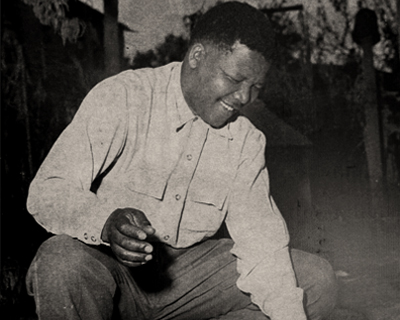
Justice Quartus De Wet found Nelson Mandela found guilty on four charges of sabotage on June 11.
The following day, June 12, he and seven of his co-defendants were sentenced to life imprisonment, avoiding the death sentence.
Mandela and the other six non-white defendants were sent to the prison on Robben Island, a former leper colony located off the coast of Cape Town.
Mandela served 27 years in prison, initially on Robben Island, and later in Pollsmoor Prison and Victor Verster Prison.
Amid international pressure and growing fear of racial civil war, President F. W. de Klerk released him in 1990.
Mandela and de Klerk negotiated an end to apartheid and organized the 1994 multiracial general election in which Mandela led the ANC to victory and became President.
5 – Military Coup in Brazil by Gen Castello Branco
The 1964 Brazilian coup d’état was a series of events in Brazil, from March 31 to April 1.
It led to the overthrow of President João Goulart by part of the Armed Forces, supported by the United States government.
The following day, with the military already in control of the country, Congress came in support of the coup and endorsed it by declaring vacant the office of the presidency.
The coup put an end to the government of Goulart, a member of the Brazilian Labour Party.
He had been democratically elected Vice President in the same election that led conservative Jânio Quadros, from the National Labour Party and backed by the National Democratic Union, to the presidency.
6 – Hindu-Muslim Rioting Breaks Out in the Indian City of Calcutta
The Hindu-Muslim riots, which began on January 13, 1964, proved to be a major setback in India’s 16-year struggle to establish and maintain a secular state with freedom and equality for all religions.
Over 7,000 people were arrested and 438 were injured. It was the first incident of religious violence since 1950.
The clashes erupted after the disappearance of a precious relic from a mosque in Srinagar, which was the capital of the Indian-held area of the disputed state of Jammu and Kashmir at the time.
As a result, anti-Hindu riots broke out in East Pakistan and 29 people were killed.
This sparked retaliation against Muslims in rural areas of West Bengal and from there the riots spread.
The rioting was eventually quelled later that month but it erupted again in March when around 100 Muslim mill workers were attacked and 21 killed.
7 – First U.S. Government Report Warning that Smoking May Be Hazardous
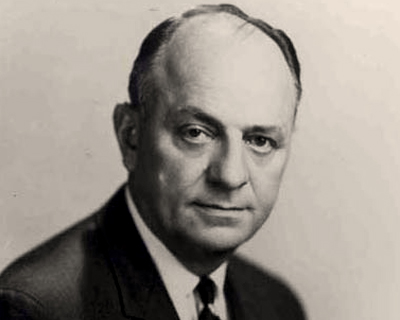
Surgeon General Luther Terry issued the Report of the Surgeon General on ‘Smoking and Health’ on January 11, 1964, choosing a Saturday to minimize the effect on the stock market and maximize coverage in the Sunday papers.
The report was front-page news and a lead story on every radio and television station in the United States and many abroad.
The report highlighted the deleterious health consequences of tobacco use. It held cigarette smoking responsible for a 70 percent increase in the mortality rate of smokers over non-smokers.
The report estimated that average smokers had a nine to ten-fold risk of developing lung cancer compared to non-smokers: heavy smokers had at least a twenty-fold risk.
The report also named smoking as the most important cause of chronic bronchitis and pointed to a correlation between smoking and emphysema, and smoking and coronary heart disease.
It noted that smoking during pregnancy reduced the average weight of newborns. The report on smoking and health had a large impact on public attitudes and policy.
In 1965, Congress required all cigarette packages distributed in the United States to carry a health warning, and since 1970 this warning is made in the name of the Surgeon General.
In 1969, cigarette advertising on U.S. television and radio was banned, effective since September 1970.
